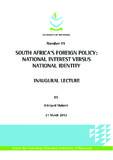South Africa's foreign policy: national interest versus national identity
Date
2012-03-21Author
Mahant, Edelgard
Costa, Sara
Publisher
Centre for Continuing Education, University of Botswana, http//www.ub.bwRights holder
Centre for Continuing Education, University of BotswanaType
Inaugural LectureMetadata
Show full item recordAbstract
When Nelson Mandela became President of South Africa, he announced that human rights would become the light which would guide South Africa’s foreign policy but, when he tried to implement such a policy, the newly democratic country found itself isolated among African states. When Mandela sought to impose sanctions on Nigeria after the execution of Ken Saro-Wiwa and nine other opposition leaders, no other African government would support him.
Thabo Mbeki, who replaced Mandela in 1999, proudly proclaimed, “I am an African”. He sought to work with other African governments, no matter how unsavoury their democratic credentials. His government tried to mediate the conflict in the Democratic Republic of Congo and maintained good
relations with Zimbabwe as that country slid into chaos. Most recently, the South African government has helped to prevent Sudan’s President Omar El-Bashir from being brought before the International Criminal Court.
What caused such a rapid change in the foreign policy of a newly democratic country? Using the theoretical framework of constructivism, I argue that it was the desire of the Mbeki regime to make South Africa a leader among African states rather than the pursuit of strategic or economic interests that led to the change in policy. This is a good example of identity politics and the search for prestige!

